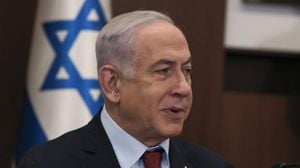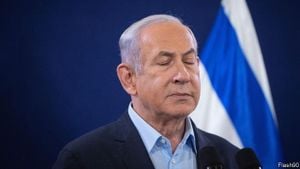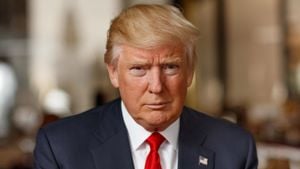The 2024 U.S. presidential election has electrified the political battlefield, igniting discussions, predictions, and strategic shifts across borders. Leading the charge of bold statements is billionaire entrepreneur Elon Musk, whose recent proclamation seems to have shifted the narrative around Canadian Prime Minister Justin Trudeau as he watches the aftermath of Trump's sweeping victory.
It’s hard to ignore the electric dynamic at play as Trump, having seized the White House again, redefines the parameters of political influence, not just within the U.S. but reverberatively overseas. Musk, who saw the potential for disruption with Trump’s return, took to his platform, X (formerly known as Twitter), to provide his take on Canadian politics. Encouraged by followers urging him to intervene against Trudeau, Musk shot back with the confident assertion: “He will be gone in the upcoming election.”
Musk's forecast isn’t just wishful thinking; it reflects the shaky ground beneath Trudeau’s feet. The Canadian Prime Minister, currently leading with only 153 of 338 seats, is running on borrowed time. Canada is bracing itself for expected electoral upheaval as the nation prepares for its federal elections, slated for no later than October 20, 2025. Trudeau is facing significant competition from the Conservative Party and the New Democratic Party, led by Pierre Poilievre and Jagmeet Singh respectively.
Far more than just the whimsy of social media predictions, the state of play is serious. After losing ground to the Conservatives according to various polls, Trudeau finds himself not only battling external opponents but internal unrest as well. A faction within the Liberal Party released its grievances openly, pressuring him for leadership reforms, reflecting dissatisfaction on numerous levels.
Despite rising dissent, Trudeau remains resolute, pursuing what could be historic: aiming for his fourth consecutive term—a feat not achieved by any Canadian Prime Minister for over 100 years. His government has been subjected to scrutiny, particularly concerning its strained ties with India, where allegations surrounding anti-India extremism have been raised. This has added another layer of complexity to Trudeau’s already challenging political environment.
This terrain isn’t lost on figures like Nigel Farage, the controversial UK politician who has been emboldened by Trump's return to the presidency. Farage, who leads the right-wing Reform UK party, celebrated Trump's victory as it mirrors his own political resurgence. This week’s events have fueled Farage's ambitions to capitalize on the same wave of populism and dissatisfaction among voters, hoping to draw from Labour’s base as they reel from the political consequences of Trump’s success.
With the stakes as high as they are, Labour politicians have been somewhat apprehensive, keeping vigilant on their left flank as Reform UK seeks to capitalize on issues such as immigration and the cost of living. The echoes of Trump’s campaign strategy resonate loud and clear across the Atlantic; it becomes evident their election campaigning may pivot to resonate with this favorable political environment for populists.
And so the saga continues, with Musk's bold assertions and Farage's burgeoning plans clashing against the backdrop of electoral struggles for Trudeau. What remains to be seen is how these cross-border dynamics will alter the political landscapes of the U.S. and Canada, shaping the path for political parties and leaders alike, especially as the international stage watches closely.
What does this all mean moving forward? It’s clear: political resilience may soon be tested as Trudeau, Farage, and Musk play their parts on the global stage, encapsulating the tumultuous nature of modern political life.



